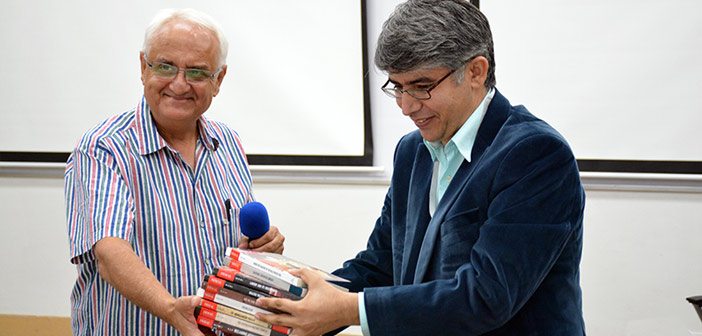The Yohsin Center for Social Development at Habib University held its second public lecture on November 5th, this time focusing on the newly set down constitution in Nepal. Given that the YCSD focuses on the development and progress of nations within the South Asian region, the public lecture set an excellent tone for the series being held at Habib University on a semi-regular basis. The esteemed South Asian journalist Mr. Kanak Dixit of Nepal was invited to address the large audience, and speak on Nepal’s search for constitutional stability. The speaker took to the stage enthusiastically, communicating with students and other attendees with vigor and passion for his work.
The speaker, Mr. Kanak Dixit is a distinguished public icon, and has been the editor of the Himalayan South Asian magazine. Hailed as one of the pioneers in the field of pan-South Asian journalism, he has been connected with the magazine for nearly 2 decades. Before his time in journalism, Kanak Dixit was part of the United Nations. When he moved to Nepal and joined the Himal collective, he would go on to become an astute observer of the political and socio-economic landscape of Nepal.
Mr. Kanak introduced his lecture with the history of Nepal and its significance in South Asia. Focusing on the economic synergy that sets Nepal apart, the speaker detailed the fact that Nepal had enjoyed a strong connectivity of transport, trade and economies of scale till recent years. “Nepal remains the oldest nation state of South Asia, bought together 250 years ago, a long time before 1947 which saw India and Pakistan rise as nations”, he said. “Unlike the two, Nepal has been a sovereign country for 200 years and thus, has gathered history that is much more diversified than India and Pakistan. This has led to a significant difference in the Nepali sensibility and that of the rest of South Asia”.
Relating to the recent formulation of the Constitution in Nepal, the speaker informed the audience of how it has been a labor of 8 years of effort, and that, adopted on September 20th, it is the 7th Constitution since the “modern era” within Nepal. According to him, if the state of Nepal had waited any longer to build a solid Constitution, the society would have been irreparably weakened. The Constitution was first written as the European colonials were departing, thus the developing elite of the country had an ethos that developed around their remaining sensibilities. This led to a controlled society which followed a constitution based on a classical design, but due to the fact that this was the advent of the modern era, the nation were more aware of their rights.
The new “Constitution of Nepal 2072” is 186 pages long, has 308 articles, and 35 chapters, and is a result of decades of hopes for a peaceful, democratic and inclusive Constitution. “A significant factor about it is, that although the Constituent Assembly is elected specifically to write down a Constitution, Nepal’s current Assembly was still under works while the new Constitution was being built”, said Mr. Dixit. This document is being hailed as a modernist constitution for the nation of Nepal, and is special because it takes into consideration the rights of a huge number of groups in Nepal. While democracy talks of individual rights, community rights are especially featured in this document. The individual Nepali has been disenfranchised by the populist politics, and the fact that their previous politicians did not stand high on principles and would not take care of their demands. But this new Constitution has become more rights-based, and covers the complete spectrum of demands, from rights of citizenship, through gender, dissent, naturalization, group rights, and women’s rights, rights for children and the elderly, and Dalits.
Mr. Dixit also touched upon the fact that rights based on origin, religion, race, tribe, sex, sexual orientation, physical condition, disabilities, marital status, pregnancy, language and geographic constitution are also covered by the Constitution, ranking it among the most liberal and forward thinking Constitution in the South Asian region. “The Constitution is flexible, in that, everything written in it has to be amendable. However, there are only 3 items that can’t be amended in the document, these are:
- Sovereignty
- Directorial integrity
- Sovereignty based on the people
Now, the fact that only three items are listed, means that our Constitution is much more flexible than those formulated for other regions of South Asia”, said Mr. Dixit.
This Constitution is Nepal’s opportunity to improve its own record in terms of political stability and history. While a small section of the population remains unhappy with the Constitution, there will be immediate amendment if need be. “However, this is an issue for Nepali citizens to take care of. Every society has dissonances, but they are internal and should be solved that way too. The current problem we are facing is that, although Nepal remains, to this day, one of the friendliest neighbors of India, it is suffering an economic blockage from the state of India”.
To explain this further, the speaker delved into the history of the issue. He spoke of the expansionary wars that Nepal went through nearly 200 years ago, that caused deep economical fissures in the country. The British Empire and colonialism followed, during which a significant amount of natives started leaving Nepal and the nation steadily declined. This was till 1990, when a dictatorial monarchy was being practiced, after which a modern era of democracy was established. In 1996, there was an insurgency in Nepal which further led to a 10 year war. “This created a lot of confusion in the nation, due to which polarizations between the Nepali societies emerged”, claimed the speaker. “When the Constitution was finally written down, there was one group that felt it was not mollified, called the “Madhesi’s”. Having the power to rouse the masses, the small group of leaders created a mass reject, after which India got involved and took matters further to change the minds of the larger society.
“India first intervened in many ways, and after constitution was adapted, they took sides and caused blockades. There is a bitter taste in the taste of Nepal because they thought it’d become an exemplary South Asian state, but that didn’t end up happening because of this political instability”, said Mr. Dixit. The Constitution was adapted by the Constituent Assembly after the elections happened in November 2013. According to reports, 82% of registered voters participated in this election, which makes it a democratic exercise. When the Constitution was adapted, it was by participation of 92% of the house, out of which 86 % of the participants voted in favor of. Thus, this was one of the first examples of a post-modern Constitution in a democratic way. “However, I believe this Constitution was weakened by the fact that it took in its regard everyone’s rights, but now I see that it really is a modern example of a Constitution”, said Mr. Dixit. “Given the socio-economic landscape of Nepal, the economic blockades have wreaked havoc in the state in its current fragile condition, and we hope for a solution soon”.
The lecture concluded with Mr. Kanak Dixit appreciating the fact that a Liberal Arts and Sciences education is being highlighted upon in Pakistan. He spoke of the need for such an education, and informed his audience of how South Asian population makes up a 4th of the world’s population, thus it is vital that a Liberal Arts education be part of our lives. The gracious speaker also presented Habib University with copies of his magazine, Himal South Asian, for its library.




